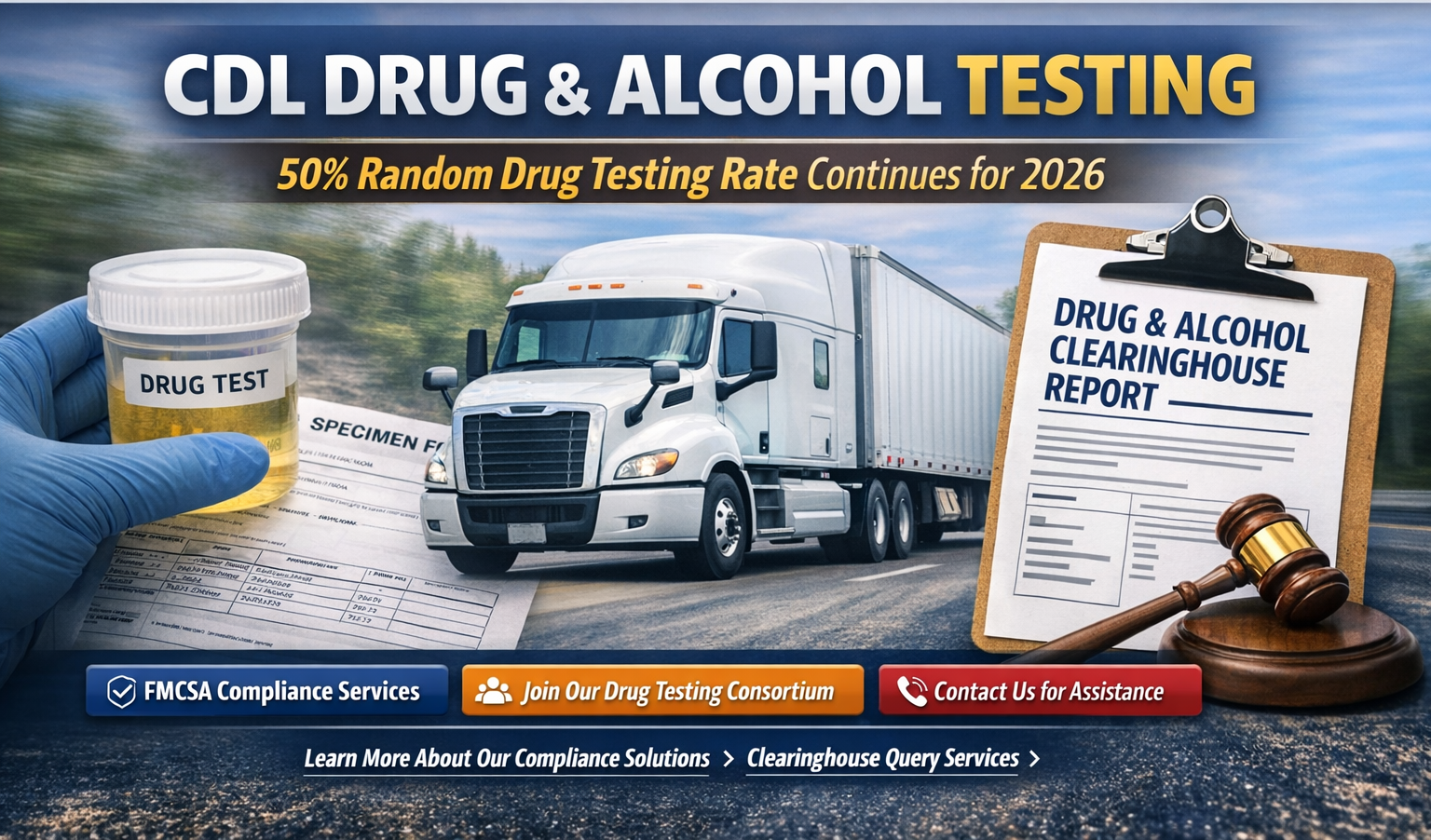Reducing Compliance Risk: Best Practices for Fleet Owners
November 20, 2025
Share this article:
For fleet owners, staying compliant with Department of Transportation (DOT) and Federal Motor Carrier Safety Administration (FMCSA) regulations is more than a legal requirement. It is a critical factor in protecting operations, managing risk, and maintaining business continuity. Compliance violations can result in costly fines, damaged reputation, higher insurance premiums, and even out-of-service orders. To reduce these risks, it is essential to adopt a proactive and structured approach to compliance across every aspect of fleet operations.
Understanding the Compliance Landscape
Fleet owners operate in a highly regulated environment, and compliance extends well beyond paperwork. It includes adhering to federal and state regulations related to driver eligibility, vehicle safety, operating hours, and controlled substance testing. Each area comes with specific requirements that are subject to inspection during audits or roadside stops.
Common compliance gaps, such as missing documentation, overdue inspections, or outdated medical certifications, can quickly escalate into major violations. These issues not only impact a company's safety scores but can also lead to intervention from regulatory authorities or loss of operating authority. Knowing where your vulnerabilities lie is the first step in mitigating them.

Strengthening Your Compliance Foundation
Maintain Accurate Driver Qualification (DQ) Files
DQ files are one of the most scrutinized areas during a DOT audit. Every commercial driver must have a complete and current file that includes their commercial driver’s license, medical examiner’s certificate, safety performance history, and required endorsements. If a document expires or is missing, it could result in a serious violation even if the driver is otherwise qualified.
Establishing a regular review schedule for all DQ files ensures nothing slips through the cracks. Fleet owners should also leverage systems that automatically track expiration dates and alert compliance managers in advance.
Ensure ELD and Hours-of-Service Compliance
Electronic Logging Devices (ELDs) are intended to simplify hours-of-service compliance, but they can also introduce risk if not used correctly. Common issues include false log edits, misclassified driving time, or drivers not logging out properly. These problems can be flagged during audits and may result in penalties.
To minimize exposure, fleet operators should provide ongoing ELD training, regularly audit logs for accuracy, and establish internal controls to identify and address discrepancies.
Prioritize Preventative Maintenance
Vehicle condition is another area where compliance and safety intersect. Fleet owners are required to conduct routine inspections and maintain records that demonstrate roadworthiness. Pre-trip and post-trip inspections, along with scheduled preventive maintenance, reduce the likelihood of mechanical failures and violations during roadside checks.
Documenting every inspection, service, and repair is crucial. Well-maintained vehicles not only help meet compliance standards. They also reduce downtime and extend asset life.
Leverage Technology to Stay Audit-Ready
Fleet compliance cannot be managed manually at scale. Today’s fleet operators need access to centralized platforms that consolidate driver records, vehicle maintenance schedules, log data, and safety metrics. These systems should offer automated alerts for expiring documents, upcoming inspections, or violations needing corrective action.
Using integrated software like National Fleet Services’ DOTFocused platform allows fleets to proactively manage compliance. From dashboard visibility to automated reporting, technology empowers managers to spot trends, reduce human error, and maintain audit readiness at all times.
Build a Culture of Compliance
Technology and processes alone are not enough. Compliance must be embedded in company culture. This starts with leadership setting the tone and creating policies that are clearly communicated and consistently enforced. Every team member, from dispatch to drivers, should understand their role in maintaining compliance and why it matters.
Regular training, performance feedback, and clear accountability help ensure that safety and compliance remain top priorities. When teams view compliance as a shared responsibility instead of just a regulatory checkbox, it leads to more consistent behavior and fewer violations.
Know How to Respond to Violations and Audits
Even with the best systems in place, issues can arise. How a company responds to violations often determines whether they remain isolated incidents or develop into systemic risks. It is critical to investigate every infraction thoroughly, determine the root cause, and implement corrective actions.
When facing a DOT audit, preparedness is key. Having organized, up-to-date documentation and a designated compliance contact can significantly reduce audit stress. Fleet owners who regularly conduct internal audits and gap assessments are better positioned to handle official reviews.
A Trusted Partner In Compliance
Reducing compliance risk is not just about avoiding penalties. It is about building a sustainable, reputable operation that is prepared for growth. From managing DQ files to monitoring ELD data and vehicle inspections, every step matters. But fleet owners do not have to do it alone.
At National Fleet Services, we help companies maintain full DOT compliance through expert support and our powerful fleet management software, DOTFocused. Whether you need help preparing for an audit, streamlining compliance processes, or reducing operational risk, our team is here to support you.
fleet insights






